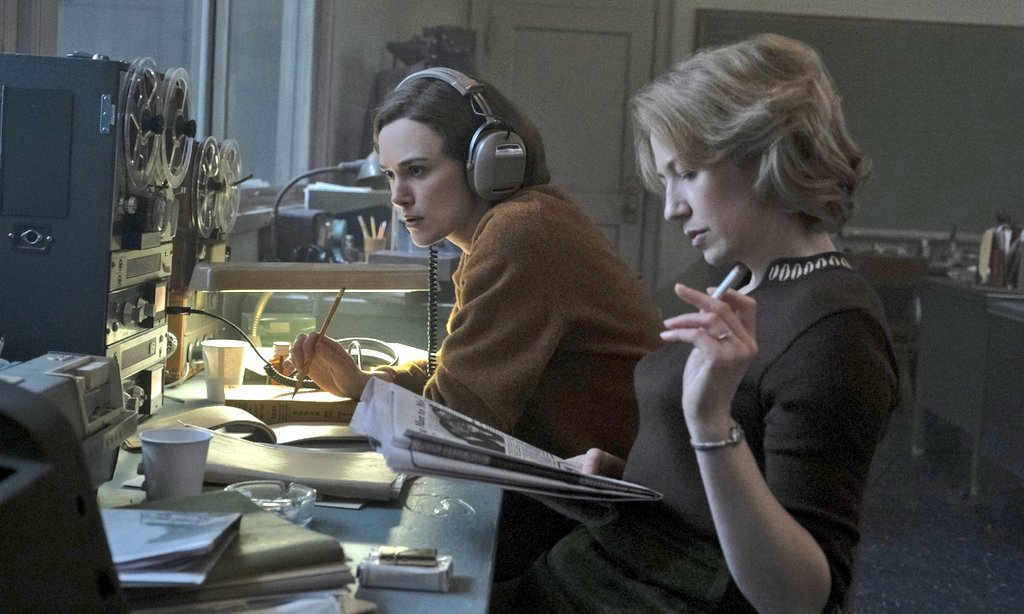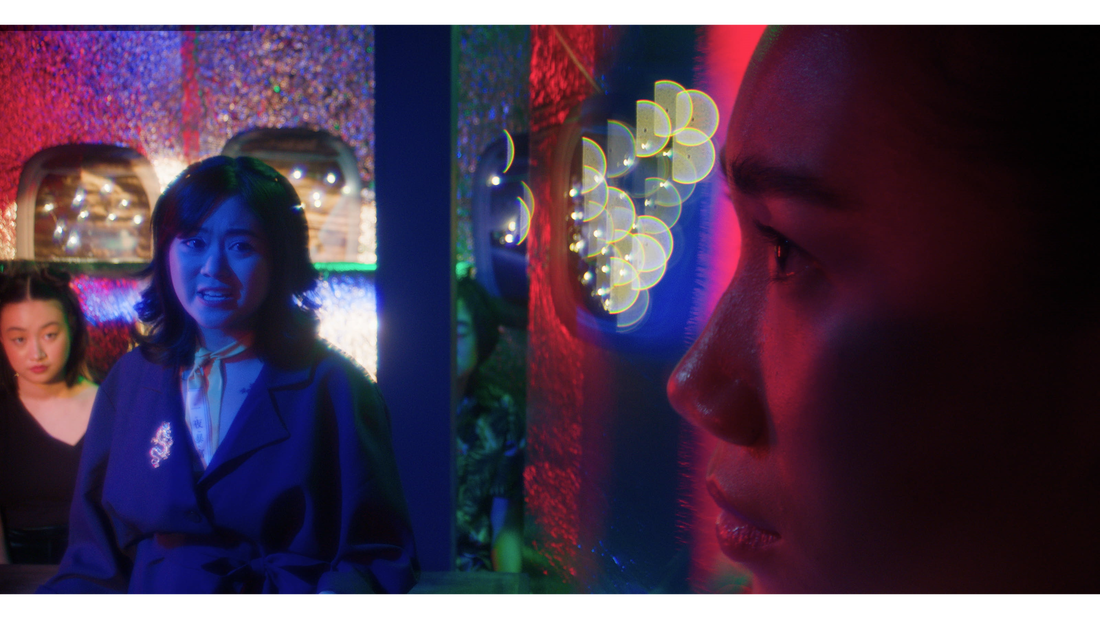|
Nadia Tereszkiewicz in "Babysitter" (2023) Following its world premiere at the 2022 Sundance Film Festival, “Babysitter” is arriving in Toronto to kick off this year’s Canadian Film Fest (CFF). The CFF is an indie-spirited festival dedicated to celebrating Canadian filmmakers. The festival returns this spring for its 17th edition, and for the first time, as a hybrid with both in-person and virtual screenings. This year’s slate has a strong focus on women in film, both in front of and behind the camera. “Babysitter,” directed by Monia Chokri and written by Catherine Léger, confronts misogyny with a sardonic point of view. The story follows Cédric (Patrick Hivon), who after committing sexual assault and losing his job, attempts to “free” himself from sexism by co-writing a book to attack misogyny. His wife Nadine (Chokri), a new mother exhausted by his behavior and in search of her own fulfillment, becomes drawn to their child’s babysitter Amy (Nadia Tereszkiewicz). Amy’s presence creates a more mysterious, playful environment. As Cédric and Nadine drift further apart, their lives become more and more like a fever dream.
The film plays up qualities of dreamlike strangeness, from the technicolor set pieces and cinematography, to the exaggerated acting. There is a cartoonish, eccentric energy to Chokri’s direction. The characters feel like caricatures instead of human beings. The costumes and sets have a coat of plasticity to them, not unlike pieces you would find in a doll’s house. While “Babysitter” has a specific vision aesthetically, the film lacks in a coherent narrative structure. Adapted from Catherine Léger’s 2017 play of the same name, Chokri’s genre-bending approach explores themes of toxic masculinity and gender politics through elements of horror and comedy. The use of different genres has its intriguing moments, particularly with the babysitter character who channels satire fairly well. However, the potentiality of this film resonating in its social commentary is overpowered by inconsistent direction and over-exaggerated performances. “Babysitter” often difficult to follow and keep engaged by, which makes one curious for how the film could have worked better through a different perspective. By centering Cédric as the protagonist, the story is told largely from his point of view as he attempts to apologize for his sexist behavior. This relegates a far more interesting character to the background: Nadine. While she isn’t given much material to work with, Chokri brings an enjoyable stoicism to the character and maintains the film’s magical realism. Nadia Tereszkiewicz’s performance as Amy fits the fairytale-like directorial style; rather than a character who advances the plot, the babysitter appears to be a figment of one’s imagination. Of the cast, Chokri and Tereszkiewicz stand out in balancing the film’s erratic tone. The rest of the ensemble leans too far into exaggeration, reaching the point where they distract from the story. This is the case for the majority of factors at play in “Babysitter.” While refreshing in its genre-bending approach, and full of energy, the muddled screenplay and unfocused direction make for a wearying experience.
0 Comments
Keira Knightley and Carrie Coon in "Boston Strangler" (2023) When it comes to journalism films that put a much-needed spotlight on women in the newsroom, the more the merrier. Often faced with harassment and sexism from colleagues, female journalists face an uphill battle of being taken seriously in the field. Such was the case in 1960s Boston, Massachusetts, when a serial killer known as the Boston Strangler terrorized the streets. He targeted women as his victims, and committed 13 murders in the city. The investigative reporters who broke the story – Loretta McLaughlin and Jean Cole of the Record American – are given the narrative focus in the Hulu film “Boston Strangler.” Written and directed by Matt Ruskin, the film follows Loretta and Jean’s tireless work around the clock to connect the murders and make the city of Boston safer for women. With similarities drawn to Maria Schrader’s “She Said” released last year, “Boston Strangler” joins the chorus of films that prioritizes women’s contributions to an increasingly important industry.
“Boston Strangler” doesn’t move at the most exciting speed, which is a road block that many true crime films face. Procedurals based around an investigation naturally have lulls in the process. Potential leads dry up. Cases become drawn out. The chase of a story can be an incredibly long process, which the film seems to take to heart. The monotonous approach grows a bit tiresome and undercuts the engaging performances that Knightley and Coon deliver in their compelling roles. The film focuses more so on Knightley’s character, Loretta McLaughlin. Her inspiring determination to cover stories beyond the lifestyle section leads to one of the most prolific pieces of journalism in history. When Loretta notices a connection between the underreported deaths of women in the city, she brings the information to her editor Jack Maclaine (Chris Cooper). After being turned down to cover the story, she persists, and ultimately gets the opportunity to pursue the investigation. Though her work faces pushback from a male-dominated newsroom, as well as a male-dominated household in which her husband James (Morgan Spector) believes she is neglecting her duties as a wife and mother. Loretta also faces the terrifying risk of putting herself into potentially dangerous scenarios. Loretta’s commitment to the work continues alongside seasoned colleague Jean Cole (Coon). The two journalists team up and become trusty confidantes who understand the personal and professional risks of this case. The film smartly focuses on the trust and bond formed between both characters. Viewers are given a resonating glimpse into Loretta and Jean’s passion and dedication to conducting the most thorough work. The film also gives a spotlight to how they put themselves in harm’s way to bring the truth to their readers, and the city at large. Adding a compelling layer to the storytelling are two great performances by Knightley and Coon. Through their authenticity and command of the screen, the strength and perseverance of their characters stands out. Additionally, there is something to be said for Ruskin’s perspective on the acts of violence. Among the most disturbing and upsetting scenes of the film are the Boston Strangler’s attacks. The assaults are not shown in full detail, and do not linger on how the violence is carried out. Ruskin admirably indicates that depictions of brutality committed against women do not need to be explicitly shown for an impact to be made. In the film, women’s perspectives are taken seriously, and their identities respected. “Boston Strangler” can be engaging to an extent, mostly thanks to committed performances by Knightley and Coon in the starring roles. The film also resonates in its focused perspective from women in the newsroom. However, the overall direction and writing feels far too reserved to capture the sense of urgency and suspense around the case. In a sea of films about true crime and journalism, “Boston Strangler” falls short of being memorable in retrospect. A still from season two of "Gay Mean Girls" (2023) Welcome to your chosen family. The viral sensation “Gay Mean Girls,” a web series based on a short film that amassed 3.5 million views in 2015, returns with a second season. Following the first season, which premiered at TIFF Next Wave in 2019, season two maintains a heartfelt journey of resonating characters and sharply written dialogue. Season one tells the story of prom committee member Lucy Ching, who in looking to foster a more diverse high school community makes the prom contest queer. The story sheds light on intersectionality and the uniquely personal experiences of navigating high school. Season two exists very much in the same vein, with the added layers of complicated activism and finding your own voice in the middle of community-driven spaces. With this new season, “Gay Mean Girls” creator and director Heyishi Zhang builds upon a raw and inspiring foundation. A brilliantly conceived idea anchored by a compelling narrative, “Gay Mean Girls” continues to shine as a deconstruction of chosen families. Season two centers on student journalist Savannah Lin (Jenna Phoa), who wants to make a documentary for a scholarship in the arts. In search of video essay subjects at Harper Heights High, she joins a queer POC safe space for young queer women and non-binary folks. A seemingly healthy discovery of individuality and friendship soon reveals to be a lot more complicated than expected. Issues of power dynamics and open secrets infiltrate what should be a safe space. As Savannah navigates the betrayal and corruption, she discovers the power of her own voice. Each episode builds on how her experiences — particularly at school and at home — shape the creator she is about to become. Savannah wants to be known as more than just a school reporter. The scholarship is an opportunity for a career in the arts and ultimately a turning point in finding her chosen family, a community that not only welcomes what she has to say, but believes in her voice. The first episode sets the tone for a deeply personal series. From the detail of Savannah’s bedroom to the lived-in family dynamics, each and every element feels derived from a truthful place. The visual touches also create a vibrant environment. From the dreaminess of “The Business of Justice” episode to the neat VHS conclusion of the series, there’s a nostalgia for physical media and enduring content. The family dynamics throughout the series reverberate as well. Savannah’s home life is one of the more engaging aspects of the series as it gives insight into her fuel for creating. Her father has made for an abusive and toxic environment in what should be a safe space. Her mother is doubtful of the artistic pursuit, just as she is about Savannah’s surroundings. “Women ruin your life in ways men can’t,” she tells her daughter. This line plants a seed for what’s to come — grounds of corruption that calls into question the meaning of inclusivity. After Savannah experiences a very troubling assault and is met with the pressure to let it go (“hurt people hurt people”), this becomes a key turning point in the series where Savannah learns the lesson of trust. Not only with what constitutes a safe space, but also when it comes to her own voice. In the protagonist’s search for a pitch for her scholarship, she learns how to be a storyteller, to invite conversation rather than demand it. She learns to unpack common phrasing such as “hurt people hurt people” and find trust within herself. It’s a scary place to be in, which the series depicts truthfully. A scene of Savannah sharing her first version of her video essay in front of an audience is something out of a horror film. From the palpable nerves to the surrealistic words of encouragement afterwards, so as not to make her feel bad about the film, it’s a strong depiction of vulnerability. What makes “Gay Mean Girls” resonate far beyond its short and sweet runtime is the creator’s commitment to those moments of being vulnerable. Creating and being creative are a window to the soul. The sensitivity around finding what truly attracts you and sharing it with the world is a leap in the dark. Each and every episode evokes the feeling of taking that leap of integrity. In the wake of such troubling betrayal, Savannah takes creative control of her life and in that turn of events, begins to flourish in a safe space of her own. She joins a queer safe space thinking she found her chosen family, but through the corruption, teaches a lesson on the validity of her own experiences — that this is more than being part of an activist community, it’s about getting to choose how to tell your stories. “Gay Mean Girls” premiered its second season on KindaTV from February 24 to March 3. All 8 episodes of season two are available to watch via KindaTV on YouTube. |
Archives
June 2024
Categories |




 RSS Feed
RSS Feed